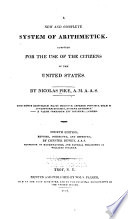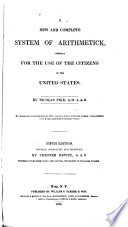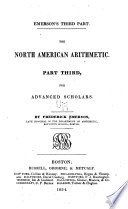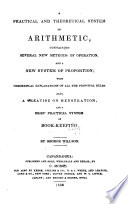 | Alexander Malcolm - 1718 - 396 σελίδες
...this Propafition, it follows clearly, that the Sum of all the Terms of an Arithmetical Progreffion, is equal to the Sum of the Extremes multiplied by half the Number of Terms; but if that Number is odd, multiply the forefaid Sum, by that whole Number ; and half the Product is... | |
 | William Enfield (M.A.) - 1821 - 302 σελίδες
...;4 + 8 = 2x6 ^ In the first case, the sum of an arithmetical progression, is equal to the product of the sum of the extremes multiplied' by half the number of terms; and in the second, to the product of the mean multiplied by the number of terms. THEOREM III. 23. In... | |
 | Nicolas Pike - 1822 - 536 σελίδες
...equal to the mean (or half the sum of the two extremes) multiplied by the whole number of terms ; or to the sum of the extremes multiplied by half the number of terms. The sum of auy number of terms of the arithmetical series of odd numbers 1 , 3, 5, 7, 9, &r.. is equal... | |
 | Bourdon (M., Louis Pierre Marie) - 1831 - 326 σελίδες
...finally S. = that is, the sum of the terms of a progression by difference is equal to the product of the sum of the extremes multiplied by half the number of terms. If, in this formula, we substitute for I its value a + (n — 1) r, we obtain further o_[2a+ («-l)r]n.... | |
 | John Radford Young - 1832 - 408 σελίδες
...a + (n — l)d, and of the latter a — (n — l)d. THEOREM 5. The sum of any series of quantities in arithmetical progression is equal to. the sum'...the extremes multiplied by half the number of terms. Let a + (a + d) + (a + 2d) + (a + 3d) + &c., be the progression ; then if the number of terms be represented... | |
 | Nicolas Pike - 1832 - 544 σελίδες
...equal tome mean (or half the sum of tiie two extremes) multiplied by the whole numbor of terms ; or to the sum of the extremes multiplied by half the number of teruw. The sum of any nmnlfr of terms of the arithmetical series of odd number* 1, 3, 5, 7, 9, ,tc.... | |
 | Samuel YOUNG (of Manchester.) - 1833 - 272 σελίδες
...the difference of the extremes divided by the number of terms minus one. And the sum of the series is equal to the sum of the extremes multiplied by half the number of terms. (1) Given the extremes 12 and 42, and the number of terms 11. Required the common difference, and sum... | |
 | Frederick Emerson - 1834 - 300 σελίδες
...multiplied by the number of terms and divided by 2; or, which amounts to the same, the sum of all the terms is equal to the sum of the extremes multiplied by half the the number of terms. For example, the sum of the following series, 2, 4, 6, 8, 10, 12, 14, 16, is 2... | |
 | George Willson - 1836 - 202 σελίδες
...the reason of this proposition is evident. PROPOSITION III. The sum of all the terms of the series, is equal to the sum of the extremes multiplied by half the number of terms ; or, multiplied by the number of terms, and the product divided by 2. For example, 1, 3, 5, 7, 9,... | |
 | Silas Totten - 1836 - 332 σελίδες
...in a progression of n terms, and dividing by 2, Hence we conclude, that the sum of the terms of an arithmetical progression is equal to the sum of the extremes, multiplied by the number of terms, and divided by 2 (Arith. 64). (84.) From the formulas Z = a+(n~ I)?, other expressions... | |
| |